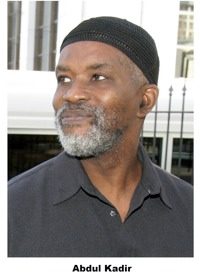
Another member of the group plotting to bomb the airport, Abdul Kadir, a socialist member of Guyana’s Parliament with extensive links to Iran, is currently in federal custody after being issued a life sentence by Federal Judge Dora Irizarry on December 15, 2010.
The planned terror attack involved an elaborate plot to blow up buildings, fuel tanks, and pipelines at New York City’s John F. Kennedy Airport.
In U.S. custody since August, 2007, Kadir was found guilty on five counts of conspiracy to attack a public transportation system, to destroy a building or other real property by fire or explosive, to attack aircraft and aircraft materials, to destroy or damage international airport facilities, and to attack a mass transportation facility.
Despite prosecutors’ initial belief that Kadir was merely a secondary player, insignificant to the plot, he has actually proven to be the most sinister and dangerous, with years of experience organizing revolutions and uprisings and creating converts to the cause of overthrowing capitalist governments. Kadir’s life of involvement in terrorism and revolution demonstrates that the cause of terrorist leaders is the spread of Marxist governments and the destruction of the West, and that they use Islam’s teachings only to recruit radical, easily-controlled followers to forward not Islamic goals, but their Marxist goals. In fact, Kadir is a case study demonstrating the unbreakable linkages between Marxist political activity and terrorism.
Kadir, a 58-year-old former civil engineer and convert to Shiite Islam, is also known as Aubrey Michael Seaforth, and has a long background in socialist and Islamist political movements.
In the 1970s, while studying at the University of Guyana, Kadir became a member of the Young Socialist Movement of the People’s National Congress, a political movement widely known as a corrupt and incompetent dictatorship and terrorist group, according to many Guyanese expatriates. As early as 1963, the movement formed a security junta, which carried out numerous domestic bombings against opposition political members.
The group also engaged in widespread voter intimidation, and sought to eliminate democratically-elected government by any means, earning itself the scorn of international human-rights advocates. These abuses were so severe that the movement was even condemned by the Carter administration, as the movement’s president, Desmond Hoyte, clung to power using thug brutality and street intimidation. Hoyte also supported Guyana’s narcotics traffickers, including the infamous drug chieftain “Blackie,” whom Hoyte honored with a state funeral and declared a “national hero.”
Kadir is a former member of the People’s National Congress Reform (PNCR) faction in Parliament, which is the present-day incarnation of Hoyte’s party. The PNCR, known for its close ties with the labor movement, hosts an annual May Day march, commemorating the international communist celebration of Marxist ideological triumphalism.
Its platform calls for “social development through the collective effort of the people” and free university education, and commits itself to “creating a society based on values and morals, including tolerance, mutual respect, care and kindness, fairness and equality, freedom and opportunity.” The party also calls for “anti-discrimination legislation,” tapping into Venezuelan hydroelectricity capabilities, and the establishment of Gender Rights Commissions.
The party also prides itself on calling for a continuation of universal healthcare programs, which they were responsible for introducing in the mid-1970s. Not as much advertised is the fact that the party was instrumental in welcoming the infamous Jim Jones and his Jonestown cult in the early 1970s, from which the party accepted numerous bribes, as the two shared common leftist political goals.
Kadir’s terrorism therefore arises from a context of radical leftist politics and tactics.
Kadir cites as his most important political influence militant leader Eusi Kwayana, a Pan-Africanist radical who formed the African Society for Cultural Relations with Independent Africa (ASCRIA) Movement, to which Kadir also belonged. The group believes that Guyana’s problems are the result of “exploitation” by British colonialism and “American imperialism.” In an interview, Kadir stated, “He (Kwayana) influenced me in the direction of developing a certain scholarship to understand the socialist principles and to go beyond situations as they appear on the surface.”
The convicted terrorist also cites as influences on his political ideology Malcolm X; convicted felon and U.S. Black Panther Party leader Eldridge Cleaver; Marxist Pan-Africanist Kwame Nkrumah; founder of the Organization for African Unity and recipient of the USSR Lenin Peace Prize; and Guyanese activist Walter Rodney.
Rodney was an important player in the Caribbean Black Power movement, and believed that the Guyanese middle class was the “enemy” of the people. In 1968, Rodney, a former professor of Kadir’s at Jamaica’s University of the West Indies, was banned from entering Jamaica because he had incited a series of deadly riots among Kingston’s students and workers known as the Rodney Riots, in which several people were killed and millions of dollars of property was destroyed. Jamaican Prime Minister Hugh Shearer also cited evidence as grounds for Rodney’s expulsion that Kadir’s professor had numerous dealings with the Soviet Union and Cuba.
Kadir also explicitly cites Rodney’s book How Europe Underdeveloped Africa as an important influence on his ideology. Rodney states in his book that European imperialism robbed Africa of its potential, and that there is a systematic scheme of power politics and “capitalist exploitation” which together result in African underdevelopment. He also expresses praise for Julius Nyerere, who implemented Fabian socialist policies as President of Marxist Tanzania — the same policies which Rodney himself had advocated.
Incidentally, Nyerere was named “World Hero of Social Justice” by Father Miguel D’Escoto Brockmann, president of the United Nations General Assembly, in 2009. Brockmann himself received the Lenin Peace Prize and served as Foreign Minister of the Marxist FSLN regime in Nicaragua in 1979. He was also a proud Sandinista and adherent to Liberation Theology who served as an official in the Roman Catholic Maryknoll Movement and in the World Council of Churches. Ironically, a cause has been opened for the beatification of Nyerere within the Roman Catholic Diocese of Musoma, Tanzania, by those in the African Church who, like Brockmann, adhere to Liberation Theology.
Kadir’s terrorist machinations and explicit hatred of the West, therefore, have a clear ideological basis in Marxist Pan-Africanism as well as in Liberation Theology, which later evolved into Kadir’s Qutbian Islamo-Socialism. In 1977, Kadir moved to Trinidad and became a member of the Islamic Party of the Caribbean, a movement, which according to its founder, Abdul Haqq, “was always looking for ways to agitate, to question the powers that be,” as well as “looking for mechanisms for change.”
Kadir also was introduced to the thought of Sayyid Qutb, the father of modern Islamism and the Jihadist Movement, through the party, whose officials met with Qutb’s brother Mohammed in Egypt in 1973. They brought back to the United States the first English copy of Sayyid Qutb’s magum opus, Milestones, in which he calls for a communitarian, social justice-oriented Islamic global conquest based on Quranic principles and Sharia law.
Kadir was also instrumental in bringing the Islamic Party and Qutbism to Guyana, where it embarked upon an aggressive program of dawah, the missionary expansion of Islam, targeted toward Guyanese workers. He even stated that his goal was to “foster the teaching of Islam in the hope of bringing about social reform.”
In 2007, Kadir became involved with the Trinidadian Islamist movement Jamaat al-Muslimeen (JAM), which shared his commitment to Pan-Africanism and black identity politics. JAM was also committed to social justice, anti-poverty measures, and land redistribution, and on July 27, 1990, under the leadership of Yasin Abu Bakr, the group launched a violent takeover of the Trinidadian Parliament and national television network.
JAM held lawmakers hostage for six days, resulting in widespread looting in the capital city Port-of-Spain. Most recently, the group partnered with the People’s National Movement (PNM), another Socialist party which believes that all people are “entitled to equality of treatment and equal access to the resources,” and is committed to “the principles of fellowship and fraternity.”
The PNM warmly embraces the JAM Movement, which frequently kidnaps members of the Trinidadian middle and upper classes and is viewed by most Trinidadians as a violent group.
Kadir also has close ties with the Iranian government. He was a close friend of Iranian cleric Mohammed Hassan Ebrahimi, and after Ebrahimi’s mysterious disappearance and murder, Kadir swiftly brought four Iranian police agents and the Iranian Ambassador to Venezuela, Ahmad Sobhani, into Guyana to investigate. Ebrahimi was headmaster of the International Islamic College for Advanced Studies, the same institution where one of the world’s most wanted terrorists, Adnan el-Shukrijumah, studied during his stay in Guyana. Kadir was a benefactor of the institution, which received funds from the Iranian government, and provided a strategic foothold for the Iranian government in Guyana, which borders Iran’s close ally, Venezuela.
Kadir used his parliamentary position to aid and abet in the harboring of el-Shukrijumah by issuing him a Guyanese passport. He was charged with plotting to blow up the New York City subway system.
Kadir is also believed to be an Iranian spy, and in July 2010, he admitted that he had contacts with Iranian officials in Caracas. Kadir sent several of his sons to study in Iranian Islamic colleges, and admitted to extensive communications with Mohsen Rabbani, the Iranian diplomat who orchestrated the 1994 terrorist attack on the Jewish Community Center in Buenos Aires, Argentina.
While on the witness stand, Kadir denied evidence that he passed along classified information on Guyana’s economy, foreign policy and military to Iranian officials, but he did admit to subverting Guyana.
Kadir drafted regular reports for the Iranian Ambassador to Venezuela, including a five-year development plan to promote Islam in Guyana, which included references to infiltrating the military, police, and other government agencies. He also arranged for several Iranian technicians to enter Guyana for the purpose of mapping out mineral reserves.
Kadir was arrested on June 2, 2007 in Caracas, Venezuela, en route to an Islamic conference in Iran. He was intercepted by U.S. informant Steven Francis, who lured Kadir into the plot to blow up Kennedy Airport.
Kadir insists he is innocent and denies any link to the Iranian government. However, the plot that he and his comrades engaged in, as they planned to blow up the country’s largest and busiest international airport, is indicative of one axiomatic principle: Islamist terrorists are abetted and emboldened by the international communist geopolitical network, as they are united in their support for “social justice” principles and their hatred for the United States and the West.
Cowards such as these three terrorists are the embodiment of what has been observed by communism expert “Jimmy From Brooklyn”:
The Communist-backed terror network employs religion, notably Islam, as the facade for its terroristic activities, as it is more exigent and desired to die for “God” than it is for a secular ideology, such as Marxism. This phenomenon has resulted in countless terror plots and even more deaths of the innocent.
Photo in rotator is of (from left to right) Abdul Kadir, Abdel Nur, and Kareem Ibrahim



